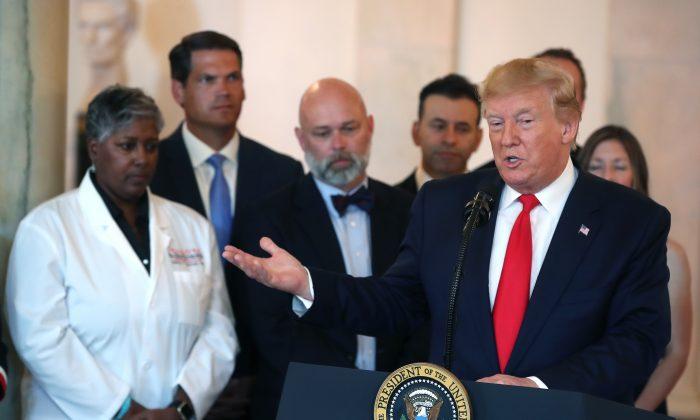WASHINGTON—Speaking at the Department of Health and Human Services (HHS) on Oct. 25, President Donald Trump vowed to take on the “global freeloading” that makes drug prices higher in the United States than other developed nations.
He announced a new rule, proposed by the Centers for Medicare and Medicaid Services (CMS), that would bring the prices Medicare pays closer to what other countries pay and save taxpayers an estimated $17.5 billion over the next five years.
Earlier in the day, HHS released a
report on drugs under Medicare Part B, which covers treatment generally administered in a doctor’s office, that estimated the United States is paying on average almost two times what other countries are paying. CMS compared prices for a basket of 27 drugs to 16 countries for its estimate: Austria, Belgium, Canada, Czech Republic, Finland, France, Germany, Greece, Ireland, Italy, Japan, Portugal, Slovakia, Spain, Sweden, and the UK.
The proposed International Pricing Index would be phased in over five years, and would apply to “most” drugs under Medicare Part B, according to CMS. The agency is looking at initially targeting single source drugs and biologicals, but could over time include multiple source drugs and Part B drugs provided in other settings, the agency
said.Initially, the proposal would cover only half of the country as it tests the model’s effectiveness at lowering prices and increasing the quality of care. CMS said it would take a “randomized approach” to deciding which areas would be covered.
The Trump administration hopes that pegging the price to other countries will also have the spin-off effect of lowering patients’ out-of-pocket costs, because cost-sharing payments for medications are calculated as a percent of what Medicare pays. If Medicare is paying lower prices for drugs, patients should be as well.
The proposed rule also takes aim at incentives for physicians to prescribe higher-cost drugs. For those administered in doctors offices, Medicare pays physicians a set fee plus an “add-on” fee calculated as a percentage of the drug price. This creates an incentive for physicians to prescribe higher-cost medications, CMS says.
Since 2005, Medicare has been reimbursing physicians 106 percent of the average sales price, which CMS determines based on reporting from manufacturers. Instead of paying the add-on fee as a percentage, CMS is proposing paying a flat fee. However, it is still seeking feedback on how that fee might be calculated.
The new model also seeks to take drug payments out of the hands of health care providers, mainly hospitals and physicians, and put them in the hands of a third party vendor. CMS is also seeking comment on what types of businesses or organizations would be ideal vendors. “Group purchasing organizations, wholesalers, distributors, specialty pharmacies, Part D sponsors, and potentially individual or groups of physicians and hospitals and/or manufacturers could perform the more flexible role of model vendor,” CMS said in its
fact sheet of the proposal.
Special Interests
In one of his first addresses after being elected, Trump accused drug companies of “getting away with murder,” which sent drug company stock prices sharply
down. He also acknowledged that they had “a lot of lobbyists” and “a lot of power,” which is possibly why Obama’s attempt to implement a similar, albeit
smaller change to Part B Medicare pricing failed in 2016.
HHS Secretary Alex Azar warned at the Oct. 25 announcement that the new proposal is “not the end of the road,” echoing previous comments that the drug industry, which he used to work in, will either change or be changed. Messages like this is likely why drug companies have
increased their lobbying power.
“It is terrific to be able to work for a president who has the courage to take on special interests,” Azar said. “And there are special interests here very deep and solidified and that will challenge the actions we take today and challenge the actions we’re going to continue to take.”






Friends Read Free